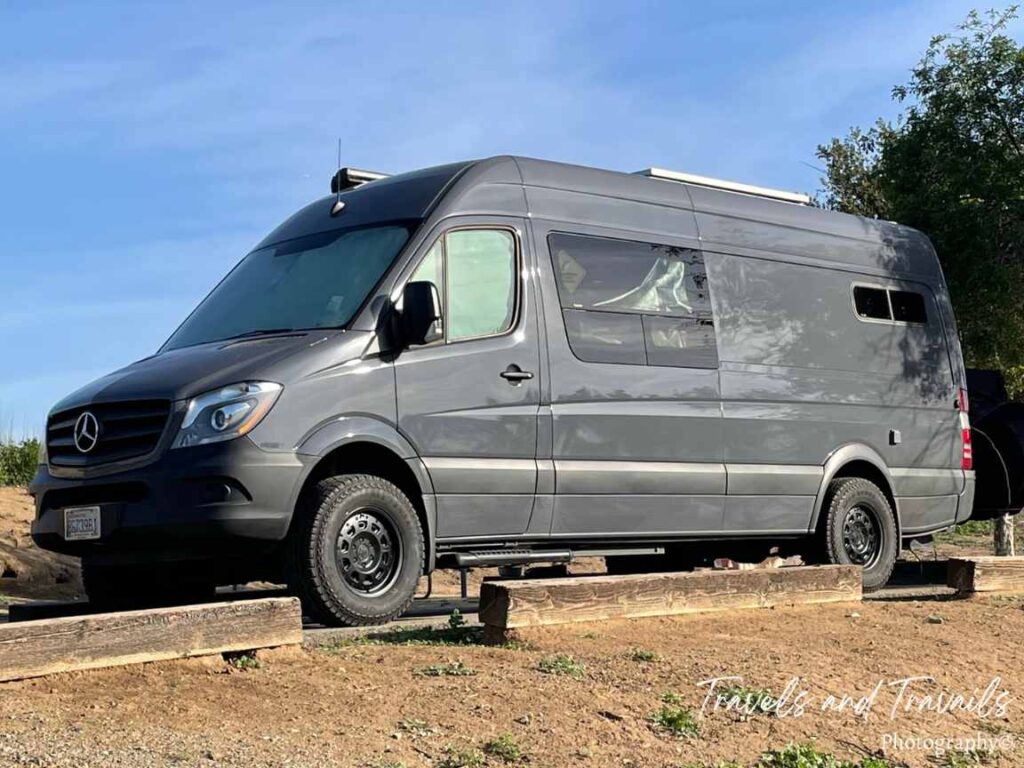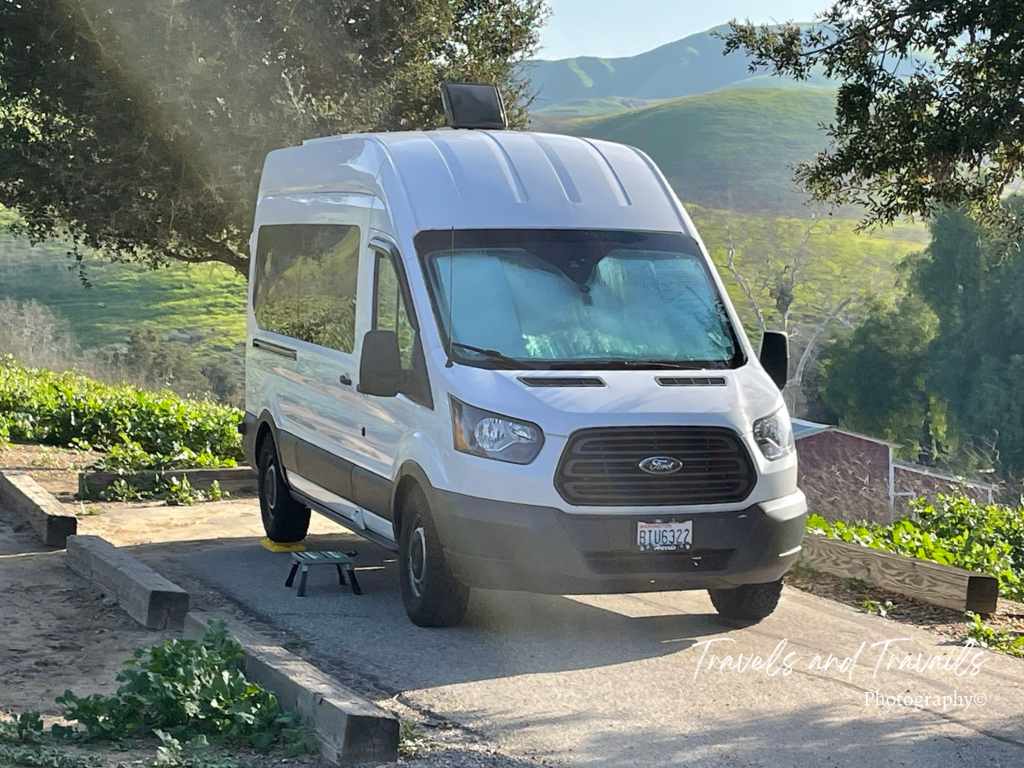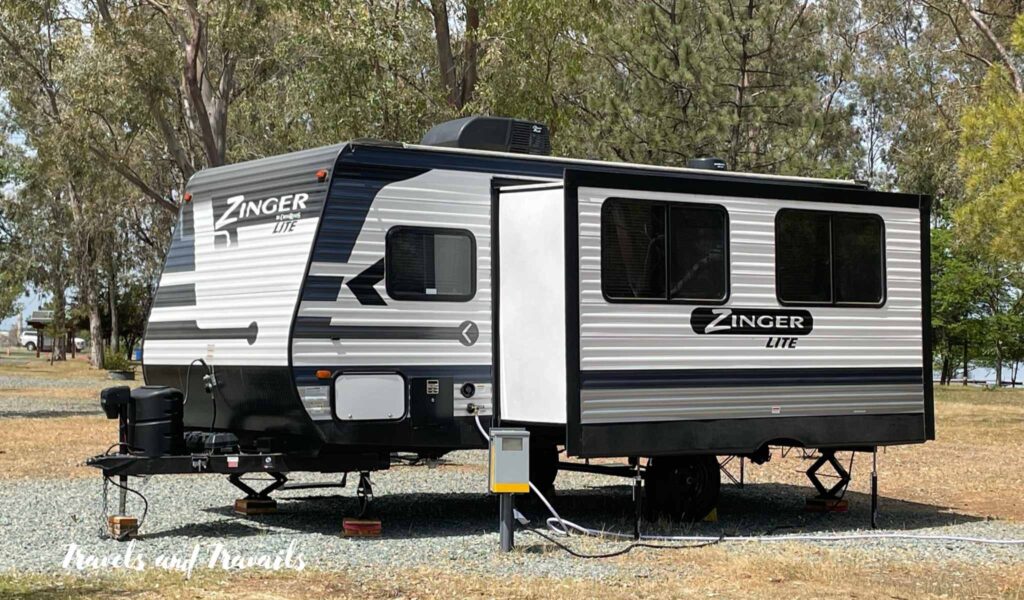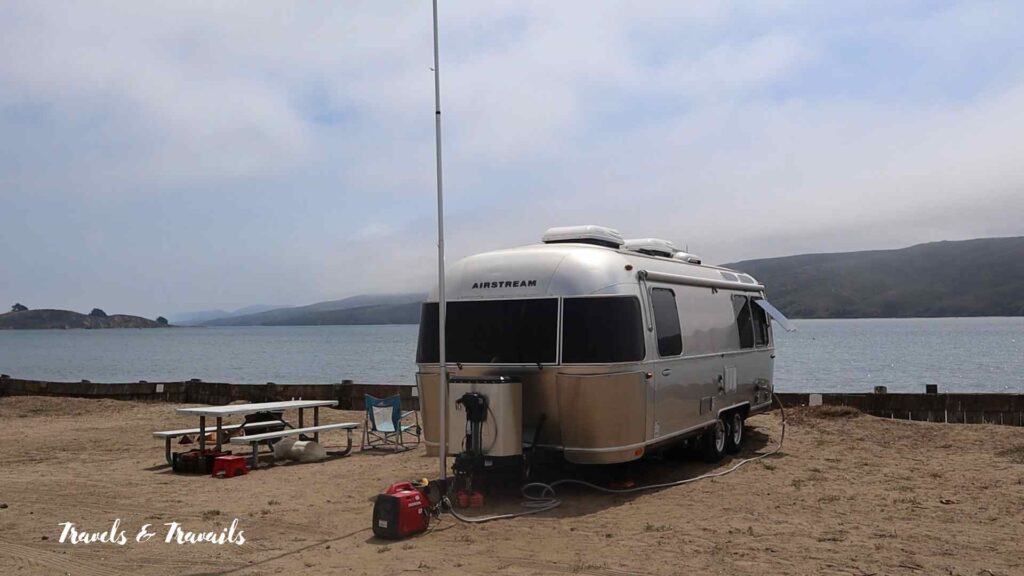If you’re considering purchasing a Trailer or a camper van, you may wonder how these travel vehicles differ and which fits you better. Unfortunately, it’s tricky to know which one to choose because both styles of travel living have recently garnered popularity. So which is better, a camper van or a travel trailer?
A camper van is a better option for traveling alone or with a partner. A camper van is also a better option for stealth camping. A travel trailer is a better option for families because of the larger amount of space available. Travel trailers are also better for extended trips because they can carry more water.
In the rest of this article, I will discuss Campervans vs. Trailers. I will go over the many benefits and drawbacks of living in both types so you can decide which option fits your needs best. So if you want to learn more about camper vans and Trailers, read on.
What Is a Campervan?

A camper van is a small vehicle converted into a living space. Some of these vans can be purchased with fully functional kitchens and other amenities, while others must be built from scratch.
Generally, the space in a campervan is relatively limited. Many don’t have functional bathrooms, though compostable toilets are an option. If you’d like to know more about toilet options for camper vans, read the article that I wrote.
Campervans are popular because of the freedom they provide. Van life has taken the world by storm, and many people are converting to this simplified way of living. However, these vans primarily appeal to young adults because they don’t have enough space for older people, who often have families to care for.
Pros of Camper vans
Some of the most significant advantages of choosing a camper van are:
- Flexibility
- Stealth camping
- Maneuverability
- Cost-effectiveness
- Easier to Boondock
- No towing
- Better gas mileage
- Easier to Heat
Let’s take a closer look at these benefits.
Flexibility
The main draw to campervans is the flexibility these vehicles bring. Because your car is also your house, you can travel anywhere without leaving the comforts of home. It’s also to run errands with a campervan than a trailer because you don’t have to unhitch anything.
Stealth Camping
Stealth camping is when you camp somewhere that isn’t designated for camping and stay inconspicuous. These locations might be parking lots or streets in a neighborhood.
Stealth camping is typically used as a temporary night setup. While it might be temporary, this form of camping is policed more heavily in large cities due to homelessness problems. So if you need to do it, you want a vehicle that blends in with the environment.
That’s where campervans’ inconspicuousness comes in handy. They blend in nicely even in the city, decreasing your chances of getting caught. This is particularly true if you’re smart about where you set up camp.
If you’d like to know more about stealth camping, read the article that I wrote.
Maneuverability
Another reason camper vans have become so popular is their ease of moving. Unlike trailers, they don’t need to be towed by another vehicle.
This compactness makes them much easier to maneuver in driving situations like sharp turns, changing lanes, parking, or exiting. It also makes campervans more suited to exploring off-grid areas that might not have the best roads, especially when fitted with a four-wheel drive drivetrain.

These vans will also do better in crowded areas since they are only a little larger than an average vehicle.
Cost Effectiveness
The cost of a camper van varies greatly. If you are purchasing an already decked-out van, it has the potential to cost you much more than a trailer.
However, the start-up costs are significantly cheaper if you plan on doing the conversion. You can expect to pay anywhere between 40,000-$150,000 for a used or new van. As for the conversion, expect to spend $6,500 – $18,000 (excluding the price of the van).
Doing the conversion yourself can save a lot of money, but you need the skill, time, and patience to see it through. I recommend hiring a conversion company to do it for you if you’ve never done it before. You don’t want to make costly mistakes that might cost more than the conversion.
Other than the initial costs, the van life is generally cheaper because you live on a much smaller scale, which means you’ll likely pay less for things like:
- Water.
- Utilizes.
- Campsite fees.
- Decor.
- Homey comforts.
This smaller living scale is also more ecologically sound since you waste much less.
Easier to Boondock
If camping away from others is a draw for you, then the ability to boondock will be necessary. Boondocking is where you camp somewhere in nature without hookups. Typically, you will find these kinds of free sites on BLM land.
Of course, you can stay off the grid in any rig. But with a camper van, it’s much easier to get far enough out to find a secluded campsite. Boondocking is also a fabulous way to cut monthly expenses like campsite fees.
If you’d like to know more about boondocking, read this article that I wrote.
No Towing
Another huge draw to camper vans is that there isn’t any towing involved. Towing another vehicle is scary, and many people opt for a van because they feel more comfortable driving one. Also, you never have to hitch a vehicle up to your van or level it when you unhitch; your home is also your car.
Better Gas Mileage
Driving a camper van is significantly cheaper because these vans have much better gas mileage than most trucks hauling a trailer. Typically you will get around 20-28 MPG (8.5-11 KPL) in a Campervan.
Easier to Heat
Lastly, the smaller space makes campervans much easier to heat. A small heater will warm up a van’s interiors more quickly than a larger trailer. The same goes for cooling. An AC, fan or whatever cooling system you opt for will have a smaller space to cool.
Also, the engine helps heat the rig because it’s close to your living space. Some heating systems also allow you to harness the heat produced by the engine for heating purposes. Alde Caravan Heating Systems is a perfect example of this.
If you install one of these, you can use a heat exchanger to recycle the waste heat from your engine and use it to heat the living space in your campervan.
Cons of Camper Vans
Though there are many benefits to the camper van, there are a few drawbacks you must be aware of before purchasing one. These include:
- Campervans have limited living and storage space.
- Your home and car aren’t separate.
- Campervans are high-maintenance.
- Getting insured at reasonable rates is difficult, especially if you do the conversion yourself.
- Campervans have non-traditional toilets.
What Is a Trailer?

A trailer is a type of RV fully fitted with a functional kitchen, living area, bathroom, and sleeping space. These rigs are the original travel home and have a reputation as being more family-friendly because they’re spacious.
Trailers typically have to be towed by a large truck. These travel vehicles are great for those who enjoy frequenting RV parks, though they are also good in most camping and boondocking situations.
Benefits of Trailers
There are quite a few benefits to selecting this kind of rig:
- The vehicle is detachable.
- There’s more living and storage space.
- It’s easier to get into RV parks.
- Trailers are low maintenance.
- A trailer holds more water.
- Trailers have bathroom space.
Let’s review these benefits in greater detail.
The Vehicle is Detachable
One of the biggest draws to a trailer is that you can detach your vehicle from the rig. Being able to separate the two is especially beneficial if you want to explore or run errands without having to take your home with you.
For instance, you don’t have to haul your home around if you want to make a quick trip into town.

There’s More Living and Storage Space
Trailers have a leg up when it comes to living space because they’re designed to be fully functional homes on a smaller scale. This makes them great for traveling with family, friends, or pets.
Trailers also come with several storage cabinets, closets, and compartments underneath the rig. You can also store items in your truck if you run out of space in the trailer.
Trailers are Easier to Get Into RV Parks
RV parks are an excellent tool for travelers, especially because many offer warm showers, gyms, and even pools. However, many of these parks are selective on what kinds of vehicles are allowed.
You will always be welcome at these luxurious parks with a nice trailer, something that might not be possible with a campervan. Keep in mind that they cost more to stay in than a campsite.
Low Maintenance
Because your trailer doesn’t have a motor, the rig’s maintenance is much less. Sure, you’ll need to provide general care and take action during the winter to keep the trailer in good condition.
Still, there is far less to maintain on your trailer home. And if you have a warranty, this will be even less of a problem.
Holds More Water
Another major draw is the fact that trailers can hold much more water. This might not seem like a big deal, but how much water your rig holds has a significant impact on things like:
- Washing dishes
- Cooking
- Drinking
- Flushing toilet
- Taking showers
More water storage means you will have to fill up less frequently. It also means you can still enjoy homie luxuries like showering while on the move.
Has a Bathroom Space
Lastly, trailers typically have bathrooms on them, which is a huge benefit compared to the compostable toilet you’ll have to lug around in a camper van. These bathrooms are usually fully functional, with a shower, sink, and toilet. The hot water will not be as plentiful as in your home, but you can still take a quick shower.
Potential Drawbacks
There are a lot of benefits to traveling in a trailer, but there are also a few drawbacks. These rigs are popular for a reason. But, like the camper van, they aren’t for everyone.
Here are some of the cons you should consider before purchasing one:
- Due to their size, trailers have limited maneuverability and are more difficult to drive.
- They’re extremely noticeable.
- You have to detach your truck to go anywhere.
- Trailers are more expensive to purchase and run (in terms of gas mileage).
Ultimately, the most significant drawbacks of this rig are moving it around and the cost. You can expect to pay anywhere from $10,000-$200,000 for a trailer.
There are some used trailers available on the cheap. However, these tend to be older trailers that often require a lot of work. Additionally, they might not be allowed in some places because many RV resorts don’t allow rigs over ten years of age.
If you want to learn a little more about the best places to find an RV for cheaper, I recommend checking out my article, “Where Is the Best Place to Find a Used RV?“.
Camper Van vs. Trailer: Which is Better?
So which is better, the camper van or the trailer? Ultimately which one is best comes down to three things:
- Your budget
- The amount of space you’re comfortable with
- Your travel expectations.
A camper van is a better option if you travel alone or with a partner. This rig allows you to stay inconspicuously on your way to other travel destinations. The potential start-up costs are also cheaper, and your monthly cost of living can be as low as desired. The main drawback is the lack of amenities such as a regular toilet and shower.
A Trailer is better if you value more living space and having all the comforts of home with you as you travel. This rig is a better option for those traveling with family or pets. It also offers more stability since you can typically stay in some RV parks for months instead of campsites with shorter stay limits.
By now, you should have a solid idea of what suits you better, a camper van or a trailer. But what about motorhomes? Check out my detailed comparison of camper vans vs. motorhomes to explore more potential options.
Conclusion
Ultimately, which rig is best depends on how you enjoy living. For example, a camper van is an excellent fit if you are more of a minimalist and enjoy camping. However, if you like flushable toilets and warm showers, a trailer will be more your style.
That said, either rig is upgradable to fit your needs with a bit of customization.
Sources
- Ordinary Traveler: Should I Buy A Travel Trailer Or A Campervan – Which Is Better?
- YouTube: A Life More Light: Van VS Trailer | Van Or RV | Which Is Better?
- Camper van Traveler: camper van Or Travel Trailer – Which One Should I Buy?
- Outside: Sprinter vs. Teardrop Trailer: What’s Best for Camping?
- Boondockers Bible: Campervan Versus Trailer for Boondocking
- Frugal Frolicker: Why Choose Travel Trailer or Caravan Life Over Van Life?
- Hivan: Van Life vs. Travel Trailer: Which Is the Better Option?
- Boonieriders: What Is A Boondocker
- EPA: Water Efficiency Technology Fact Sheet Composting Toilets
- Keep Calm and Travel: The Difference Between a Camper Trailer, Caravan, or Camper Van For Your Amazing Road Trip!
- Uprooted Traveler: Eight Reasons Why You Should Buy a Travel Trailer Instead of Vanlife
